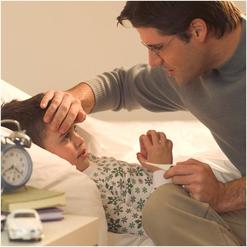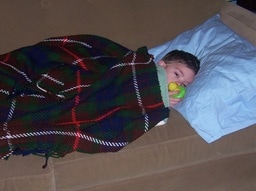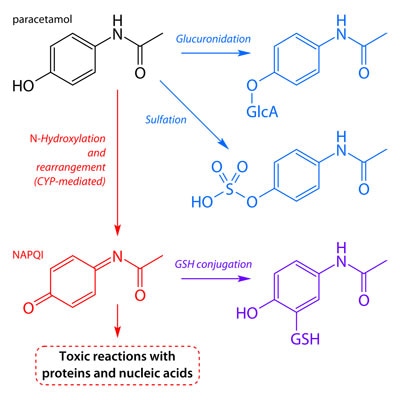
A fever is the body's natural response to a bacterial or viral infection. A fever increases metabolic rate and can speed up the healing process. More white blood cells, like macrophages (cells that eat foreign invaders), are produced and released at a faster rate during a fever. The biochemical process that causes fevers is quite complicated but one of the key players is interferon. It's a protein that is released from cells that are infected with a virus or bacteria in order to help protect other non-infected cells. Interferon triggers a cascade of events that eventually lead to the part of the brain that controls body temperature, the hypothalamus, to reset the body's thermostat.
In most cases, fever is not a dangerous situation. A fever as high as 104° in a child, while uncomfortable, is the sign of a healthy response. In adults a fever up to 103° is considered safe and healthy. In fact, in some cases it may be beneficial to try to raise the temperature if a fever is only 99-100°. The biggest concern with fevers in children for many parents is seizures. Febrile seizures occur in only 2-5% of children 6 months old - 5 years old. (Duffner, 2008) They are a benign form of seizure that have no known impact to cognitive function. (Sadler, 2007) The main cause of febrile seizures is dehydration and electrolyte imbalance. However, there are some genetic causes that increase the risk of febrile seizure as well. (Saghazadeh, 2014) Staying hydrated during a fever is the number one goal. This will not only help with overall headache and body aches it also helps to avoid febrile seizures in young children. Naturally, if a fever continues for more than 1-2 days and symptoms like cough, head congestion or diarrhea worsen you should seek medical help.
The loss of appetite that comes with having a fever is the body's means of conserving energy. The body spends 60% of its energy on digestion and when digestion is slowed down or not needed then that energy can be used to fight infection.
It's important to try to avoid suppressing a fever for as long as possible. Medication to help lower a fever like ibuprofen can be used if fever is very high for a prolonged period or gets too high too quickly. I highly recommend avoiding acetaminophen (Tylenol, Paracetamol) because it lowers glutathione levels, which is our body's most powerful internal antioxidant for battling oxidative stress. A metabolite of acetominphen metabolism within the body is N-Acetyl-p-benzoquinone imine (NAPQI). This compound was found to dose-dependently inhibit glutathione reductase, the essential enzyme of the antioxidant system. (Rousar, 2010)
Tylenol should also be avoided in pregnancy. A study from 2013 published in the International Journal of Epidemiology (Brandlistuen, 2013) stated, "Children exposed to long-term use of paracetamol during pregnancy had substantially adverse developmental outcomes at 3 years of age." They also reported that children exposed prenatally to even short use of paracetamol had poorer gross motor skills. In 2016 researchers from UCLA studied 1491 mothers and children. They discovered some evidence that maternal paracetamol use during pregnancy was associated with poorer attention and executive function in 5-year-olds. (Liew, 2016)
- Hydrate - encourage drinking of homemade electrolyte replacement drink that can be made into popsicles as well.
- Enhance a fever if needed with chamomile, ginger and yarrow tea.
- Monitor the temperature frequently, especially in a child. The most accurate way to obtain the temperature in a young child is rectally, but other means can be used as well.
- Rest - No matter how busy you are you must conserve energy and stay in bed. To keep young children still try putting on their favorite video (an exception to limiting screen time for children). Often the aches and malaise that come with the fever don't allow for much activity.
- Observe for signs of dehydration. Babies should urinate at least once every 6 hours, children and adults should urinate at least once every 8-12 hours. Sunken eyes, dry mouth, dark urine, little to no tears when crying, lethargy, dizziness and even confusion are all signs of dehydration.
If your child experiences a febrile seizure:
- Seek medical help immediately, not tomorrow morning. Call 911.
- While waiting for emergency help, keep your child upright and make sure their airway stays open and they are able to breathe. Watch for changes in your child's breathing and/or color.
- Stay with your child and speak reassuringly.
- Clear the area around your child to prevent injury. Do not try to hold your child down. Restraining a thrashing child can cause additional injury. Try placing a soft pillow or blanket under your child's head. Loosen clothing to prevent injury and ease discomfort.
- Do not try to force anything into your child's mouth. You might cause choking, or suffer a bite yourself.
- If vomiting occurs, turn your child's head to the side so that there is no risk of your child choking on inhaled vomit. If possible, keep your child's whole body turned on the side as well.
To cool a really high fever naturally and help a child or adult with a fever try a wet sheet wrap. For a small child a pillow case can be used. Get the sheet or pillow case soaking wet with cold water. Be sure to wring it out well so that it isn't dripping wet. Wrap the child very quickly in the sheet or pillow case and cover the wet sheet with a warm blanket, preferably wool. It's most important to wrap the torso, so their arms can be free if they aren't comfortable being wrapped tightly. They may object at first to the cold wet sheet, but will soon be comforted by the cooling sensation. They will most likely fall asleep shortly after being wrapped up. Let them sleep as long as they can in the wrap; two hours or more is best. If they will tolerate it all night long that is ideal. For an adult lay the dry blanket on the bed and place the wet sheet on top of that. Lay down on the wet sheet and wrap yourself up snugly or have someone help you. Again, sleep in this for as long as you can tolerate it, preferably overnight. The sheet will be dry in the morning. This technique can be used to help "break" a fever.




 RSS Feed
RSS Feed